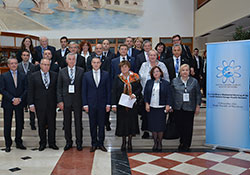Ministers reaffirm commitment to the South-eastern Europe Health Network

Ministry of Health of the former Yugoslav Republic of Macedonia/Daniel Popadinovski
Ten health ministers met in Skopje, the former Yugoslav Republic of Macedonia on 18 November 2014, to underline their commitment to subregional collaboration and discuss health reform in line with Health 2020, the European policy for health and well-being, and the South East Europe (SEE) 2020 Strategy: Jobs and Prosperity in a European Perspective.
Purpose of Extraordinary Ministerial Meeting of the South-eastern Europe Health Network
The ministers met to exchange views, experience and lessons learned about the top common priorities of the member countries of the South-eastern Europe Health Network (SEEHN). These include:
- health reform and the whole-of-government approach to the implementation of Health 2020;
- the education and mobility of human resources for health; and
- emergency preparedness and response in south-eastern Europe.
The Extraordinary Ministerial Meeting of the South-eastern Europe Health Network brought together the health ministers of Albania, Bosnia and Herzegovina, Bulgaria, Croatia, Israel, Montenegro, the Republic of Moldova, Romania, Serbia and the former Yugoslav Republic of Macedonia; other representatives of SEEHN member countries; and the WHO Regional Director for Europe and the Deputy Secretary-General of the Regional Cooperation Council.
At the Meeting, the ministers committed themselves to communicating the key messages of the Skopje Pledge to their governments, institutions and communities, to help improve the health of people in south-eastern Europe in the 21st century.
Opening the meeting, Mr Nikola Todorov, Minister of Health of the former Yugoslav Republic of Macedonia, said: “The social and economic integration in south-eastern Europe is fast becoming a reality. We should take this situation as an opportunity also to address both health challenges and opportunities in our subregion. Working together is part of the history of our populations, and that is the only way for us to respond to challenges, embrace opportunities and create a climate for innovative mechanisms to enhance our collaboration in the best interest of our populations’ health.”
WHO/Europe’s contribution
Addressing ministers, Ms Zsuzsanna Jakab, WHO Regional Director for Europe, praised SEEHN for its work to enhance public health, and its contribution to implementing Health 2020, the European Action Plan for Strengthening Public Health Capacities and Services and the Action Plan for Implementation of the European Strategy for the Prevention and Control of Noncommunicable Diseases. She recognized the importance given by SEEHN to concrete work plans and activities with partners, its ability to contribute to public health developments in Europe and its comprehensive technical work carried out through the leadership and coordination of its regional development centres.
WHO is a key partner for SEEHN, and has been instrumental in its establishment, development and functioning.



